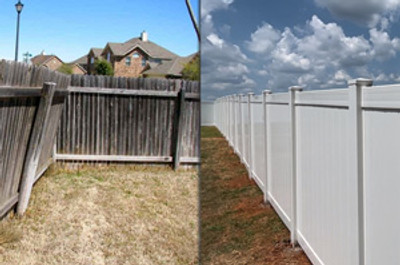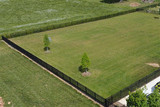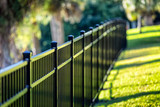Exploring the Pros and Cons: Wood vs. Vinyl Privacy Fences
Privacy fences are a popular choice for homeowners looking to enhance their outdoor spaces and secure their property. When it comes to materials, two of the most commonly used options are wood and vinyl. Each of these materials has its unique characteristics, advantages, and disadvantages. In this blog post, we'll delve into the key differences between wood and vinyl privacy fences to help you make an informed decision for your specific needs.
Wood Privacy Fences
1. Aesthetic Appeal
Wooden privacy fences have a timeless and classic look that complements various architectural styles and outdoor landscapes. They provide a natural and warm appearance that blends well with the environment.
2. Customization
One of the biggest advantages of wood fences is their versatility. They can be easily customized to fit your preferences. You can choose from various wood types, finishes, and designs to create a fence that suits your aesthetic vision.
3. Eco-Friendly
Wood is a renewable resource, making it an eco-friendly option. Many homeowners appreciate the sustainability of wood when compared to other materials like vinyl.
4. Maintenance
On the downside, wood fences require regular maintenance. This includes painting, staining, and sealing to protect the wood from the elements, pests, and decay. Without proper care, a wood fence can deteriorate over time.
5. Durability
Wood fences can have a long lifespan if adequately maintained. However, they are susceptible to rot, warping, and insect infestations, which can be more significant concerns in humid or wet climates.
Vinyl Privacy Fences
1. Low Maintenance
Vinyl privacy fences are a popular choice due to their low maintenance requirements. Unlike wood, vinyl doesn't need staining, painting, or sealing. Cleaning with soap and water is usually sufficient to maintain its appearance.
2. Durability
Vinyl is highly durable and resistant to pests, rot, and weather conditions. It is an excellent choice for those living in areas with harsh climates, as it can withstand extreme temperatures and UV radiation.
3. Longevity
Vinyl fences have a longer lifespan compared to wood fences. They are designed to last for decades without significant degradation.
4. Limited Customization
While vinyl fences come in various colors and styles, they might not provide the same level of customization as wood. Some homeowners prefer the natural look of wood and might not find vinyl's appearance as appealing.
5. Eco-Conscious Considerations
Vinyl is a synthetic material made from PVC, and its production can have environmental impacts. While some manufacturers use recycled materials in their vinyl fences, it may not be as eco-friendly as wood.
Conclusion
In the wood vs. vinyl privacy fence debate, there is no one-size-fits-all answer. The choice between these materials depends on your priorities, budget, and the specific conditions of your location. Wood fences offer a classic, customizable look but demand more maintenance. On the other hand, vinyl fences are durable, low-maintenance, and have a longer lifespan, but may not provide the same natural aesthetic.
Consider your priorities and weigh the pros and cons of each material when deciding which is the best fit for your home. Ultimately, your choice should align with your preferences, your willingness to maintain the fence, and your budget. Whichever option you choose, a well-installed privacy fence can enhance your property's aesthetics, security, and privacy.
Recent Posts
-
Why Winter Is the Best Time to Order Your Fence
When most people think about installing a new fence, spring and summer usually come to mind. But sav …Jan 31st 2026 -
Experience, Reputation, Customer Service
Here’s why buying from OnlineFenceStore.com is a strong choice for fencing products: Key Advantages …Aug 13th 2025 -
How to Order Fence from OnlineFenceStore.com: A Step-by-Step Guide
How to Order Fence from OnlineFenceStore.com: A Step-by-Step Guide Ordering a fence online has never …Jul 30th 2025







